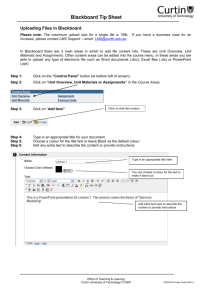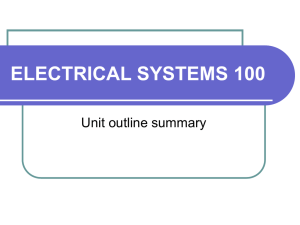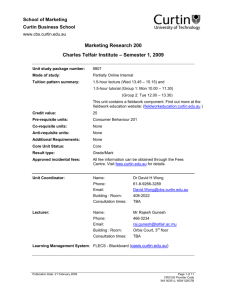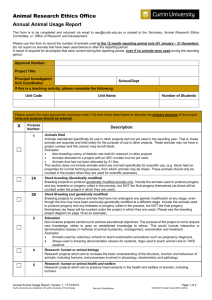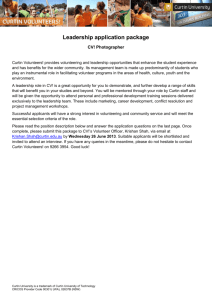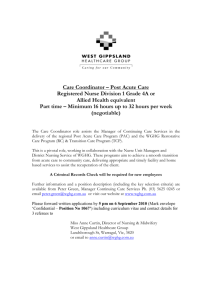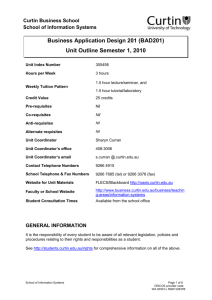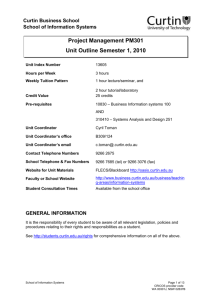flow project document
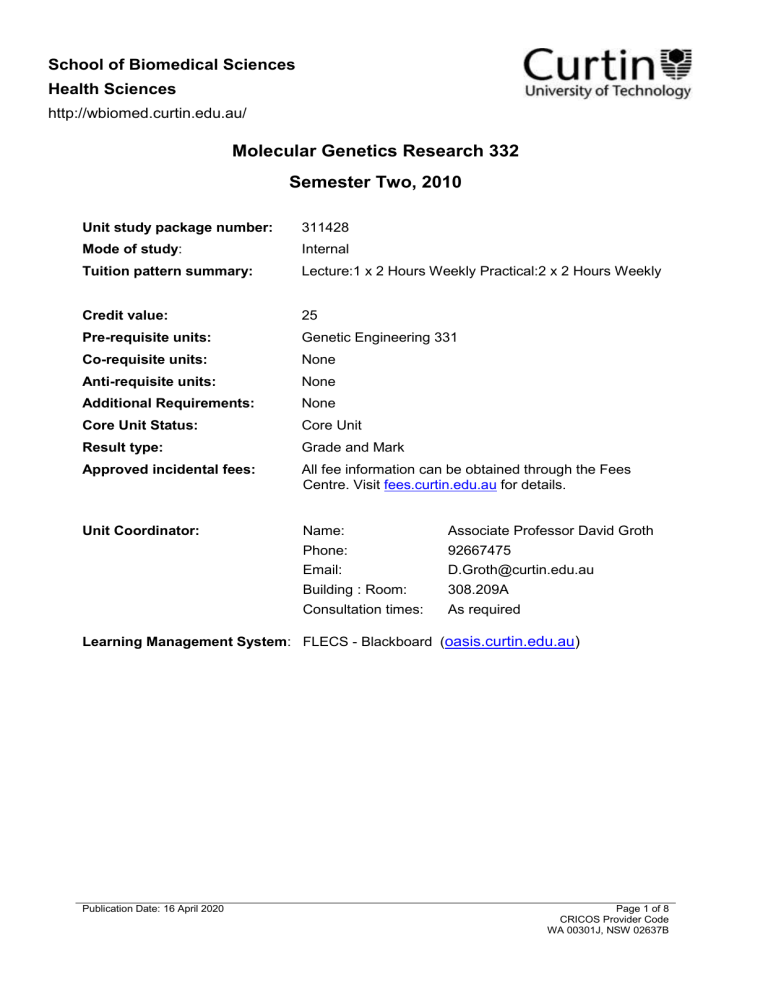
School of Biomedical Sciences
Health Sciences http://wbiomed.curtin.edu.au/
Molecular Genetics Research 332
Semester Two, 2010
Unit study package number: 311428
Mode of study : Internal
Tuition pattern summary: Lecture:1 x 2 Hours Weekly Practical:2 x 2 Hours Weekly
Credit value:
Pre-requisite units:
Co-requisite units:
25
Genetic Engineering 331
None
Anti-requisite units:
Additional Requirements:
Core Unit Status:
Result type:
Approved incidental fees:
None
None
Core Unit
Grade and Mark
All fee information can be obtained through the Fees
Centre. Visit fees.curtin.edu.au
for details.
Unit Coordinator: Name:
Phone:
Email:
Building : Room:
Associate Professor David Groth
92667475
D.Groth@curtin.edu.au
308.209A
Consultation times: As required
Learning Management System : FLECS - Blackboard (
oasis.curtin.edu.au
)
Publication Date: 16 April 2020 Page 1 of 8
CRICOS Provider Code
WA 00301J, NSW 02637B
Syllabus
Principles and applications of molecular genetics. Strategies and approaches used to locate and identify genes involved in conferring a particular trait (for example, disease).
Chromosome mapping, linkage analysis, gene expression, analysing gene function, gene organisation, immunogenetics and developmental genetics.
Introduction
Molecular Genetics Research 332 is structured to enable a student to gain an understanding of the molecular basis of transmission and function of genetic information. I this unit, the main principles and their application to molecular genetics are explored in detail. The overall objective of the unit is to provide an understanding of the strategies and approaches used to locate and identify genes involved in conferring a particular trait e.g. disease. The unit will explore chromosome mapping, linkage analysis, gene expression, and analysing gene function. Application of these techniques will be discussed in lectures and explored in the practical sessions.
Unit Learning Outcomes
On successful completion of this unit you will be able to:
1. Demonstrate the ability to critically evaluate research (CGAs 1, 2)
2. Perform, document and evaluate laboratory experiments in a professional and ethical manner (CGAs 1, 2, 4, 5, 9)
3. Apply knowledge of basic molecular techniques in genetic research (CGAs 1, 2, 8, 9)
4. Present (orally) and defend research findings (CGAs 1, 2, 3, 4, 9)
Learning Activities
This unit is designed to give you a taste for research. There are no pre-determined practical exercises, instead you are given a problem, and then we work with you to plan and execute an experiment that will solve the problem. You will learn about experiment design, planning and trouble-shooting. You will also learn how to correctly record your research to comply with potential commercialisation opportunities. The lectures are arranged into Topic blocks, with the broad categories: Research skills, Finding Genes, Analysing Genes and
Applications. For each of the last three sections, there will be theory focussed lectures followed by examples of the application of the theory delivered by current researchers in the field.
Learning Resources
Recommended Texts
You do not have to purchase the following textbooks but you may like to refer to them.
Human Molecular Genetics 3 rd (2004) or 4 th edition, Strachan, T. and Read, A.P.
(2010)
At the Bench: A laboratory Navigator. Barker, K.
Publication Date: 16 April 2020 Page 2 of 8
CRICOS Provider Code
WA 00301J, NSW 02637B
“Molecular Cloning, a Laboratory Manual” is the industry standard laboratory methods book. It is available in the library.
Online Resources
A very valuable online source of information about techniques in molecular genetics is
“Current Protocols” published by Wiley InterScience. This book has explanations as to why certain methods work, and what alternatives are available. Selected protocols from this book are available online on the website of the company Invitrogen
( https://catalog.invitrogen.com/index.cfm?fuseaction=iProtocol.home
).
Online books and other useful references can be accessed and searched on line through the
National Centre for Biotechnology Information “Entrez” web site
( http://www.ncbi.nlm.nih.gov/entrez/query.fcgi?db=Books ).
While you are encouraged to use the internet to find reference material, please be aware that non-peer reviewed material from the web is NOT considered a reputable source of information. Just because it is published on the web doesn’t mean that it is correct! Your main sources of information should be journal articles, reviews and textbooks.
Assessment Schedule
Task Value (%) Date due
Unit Learning
Outcomes assessed
Literature Review 20 Week 6 1
Project Report & Lab book
Topic Quizzes
Oral Examination
50
20
10
Exam Week 1
Ongoing/unannounced
Week 14
1, 2
1, 3
1, 4
Detailed information on assessment tasks
1. Literature Review
For this assessment task you will prepare a minireview of the literature on “The structure and function of the MHC class I gene region in ungulates ”. Your review should be a maximum of
3000 words long (this is a strict limit). It should be presented with 2.5 cm margins, with a minimum of 12-point font, and have double spaced lines. You should submit a hard copy of your review to the Unit coordinator AND submit an electronic copy through Turnitin. The literature review is due at or before 5pm on Monday 6 th September . Late submission of this assessment will incur a 5% per day (or part thereof) deduction on your mark.
Resource materials for the review must comprise mainly recent journal articles, and NO non peer-reviewed material will be accepted (e.g. No Wikipedia!) Locating journal articles via web search is, of course, the most efficient way to go about it, but you must then lay hands on the articles themselves - preferably in full. Abstracts are of limited value, and can be misleading.
Marks will be based on content (depth, breadth, currency and quality of resources, level of understanding of the material) and also to a minor extent on presentation (layout, visual appearance). A marking proforma will be provided. The final product must be well presented, logically sequenced, have good continuity, and should present a well-rounded summary of
Publication Date: 16 April 2020 Page 3 of 8
CRICOS Provider Code
WA 00301J, NSW 02637B
current information relating to the topic. Please note that a literature review DOES NOT consist of a series of quotes taken directly from references, but a synthesis, condensation, and interpretation of information derived from various sources. Direct quotations are to be avoided unless there is an extremely good reason for using them. You are advised to select a journal relating to the topic (e.g. Animal Genetics, Immunogenetics), and examine a review article to gain a clearer understanding of what is expected.
Referencing must be full, consistent, and must include authors' names and dates in the text, rather than numbers. A full reference list must be provided, using the Curtin Chicago referencing style. You may be asked to provide your references, so don’t be tempted to reference a paper that has been quoted in another paper. All material that you reference should be material that you have read yourself. The standard required will be expected to be very high. A review article is not an easy task, and you should start your research as soon as possible.
2. Project Report & Lab book
The Project report is a document describing the “Why?” “What?” and “So what?” of your laboratory project. It is due at or before 5pm on Monday 15 th November . Late submission of this assessment will incur a 5% per day (or part thereof) deduction on your mark.
The project report should have the following sections (the marks allocated for each section are shown in parentheses):
1. Literature review/ Introduction ( 10% )
2. Material and Methods ( 15% )
3. Results ( 10% )
4. Discussion ( 35% )
5. References ( 5% )
6. Lab book ( 20% )
The report should contain double-spaced 12-point font with 2.5cm margins. Submit a hard copy. Please do not put it into a folder or plastic sleeve, just staple it in the top left hand corner. We appreciate that you want to make it look nice, but anything other than a simple staple makes it harder to mark. The report does not need to be long to get good marks. The highest marks will go to a report that is thorough, concise and unambiguous. A detailed report guide will be provided to you separately.
3. Topic Quizzes
The topic quizzes will test your ability to synthesise information from the lectures and apply that knowledge to different research scenarios. At the beginning of some lectures there will be a quiz relating to material from the previous lecture (or set of lectures).
4. Oral Examination
The oral examination will evaluate your ability to verbally explain the reasons for, and the significance of, the work that you have been doing in the laboratory. The oral will be held during laboratory time in week starting on the 1 st November (last week before study break) . It involves a very brief session with two or three other people (very friendly & supportive people) that will last less than 10 minutes. You will be asked three or four questions relating to your research project. It is an “open book” exam in the sense that you are able to bring in any material that you think may help you recall what you did, what were the results of your work, and what did the results mean.
Publication Date: 16 April 2020 Page 4 of 8
CRICOS Provider Code
WA 00301J, NSW 02637B
Fair assessment through moderation
Moderation describes a quality assurance process to ensure that assessments are appropriate to the learning outcomes, and that student work is consistently evaluated by assessors. Minimum standards for the moderation of assessment are described in the
Assessment Manual, available from policies.curtin.edu.au/policies/teachingandlearning.cfm
Late penalties
Due dates have been selected in order to spread your workload and allow timely feedback.
Therefore, a penalty of 5% per day or part thereof will apply to any late submissions unless prior arrangement has been made.
Pass requirements
A mark of 50% or greater is required in order to pass this unit. Failure to attempt and pass any of these assessment tasks may result in a fail for the unit. It is necessary to demonstrate attainment of each learning outcome to achieve a pass in this unit.
Referencing style
Students should use the Chicago-Curtin referencing style when preparing assignments. More information can be found on this style from the Library web site: library.curtin.edu.au/research_and_information_skills/referencing
Supplementary information
Enrolment and HECS:
It is your responsibility to ensure that your enrolment is correct - you can check your enrolment through the eStudent option on OASIS, where you can also print an Enrolment
Advice.
Supplementary/Deferred Exams:
Supplementary and deferred examinations granted by The School of Biomedical Sciences will be held in early December 2010 most likely the week beginning the 13 th December.
Notification to students will be made after the The School of Biomedical Sciences Board of
Examiners meeting via the Official Communications Channel (OCC) in OASIS. It is the student’s responsibility to check their OASIS account for official Curtin correspondence on a weekly basis. If your results show that you have been awarded a supplementary or deferred exam you should immediately check your OASIS email for details.
Plagiarism
Plagiarism occurs when work or property of another person is presented as one's own, without appropriate acknowledgement or referencing. Plagiarism is a serious offence. For more information refer to academicintegrity.curtin.edu.au
Publication Date: 16 April 2020 Page 5 of 8
CRICOS Provider Code
WA 00301J, NSW 02637B
Plagiarism Monitoring
Some (or all) assessments in this unit may be monitored for plagiarism using Turnitin (see turnitin.com
). Students who do not want assignments retained in the Turnitin database must lodge a special request prior to the submission date. For further advice see academicintegrity.curtin.edu.au/studentsturnitin.html
Student Rights and Responsibilities
It is the responsibility of every student to be aware of all relevant legislation, policies and procedures relating to their rights and responsibilities as a student. These include:
the Student Charter,
the University’s Guiding Ethical Principles,
the University’s policy and statements on plagiarism and academic integrity,
copyright principles and responsibilities,
the University’s policies on appropriate use of software and computer facilities,
students’ responsibility to check enrolment,
deadlines, appeals, and grievance resolution,
student feedback,
other policies and procedures
electronic communication with students
See students.curtin.edu.au/rights for comprehensive information on all of the above.
Recent unit changes
We welcome feedback as one way to keep improving this unit. Students are encouraged to give unit feedback through eVALUate , Curtin’s online student feedback system (see
http://evaluate.curtin.edu.au/info/index.cfm
). Recent changes to this unit include:
1. Changing from multiple small group projects to individual projects will enable each student to get maximum hands-on experience in the laboratory
11 May – 21 June in Semester 1
12 October – 22 November in Semester 2
Publication Date: 16 April 2020 Page 6 of 8
CRICOS Provider Code
WA 00301J, NSW 02637B
Program calendar
Lectures: Tuseday 10-12am : 405.206
Practicals: Session 1 – Tuesday 3-5pm: 310.103B
Session 2 – Wed 9-11am: 310.103B
Week
Orientation
1.
2.
3.
4.
5.
Begin Date
26th July
2 nd August
9 th August
16 th August
23 rd August
30 th August
Lecture 1 Lecture 2
Overview of project
Record keeping
Literature Review Skills
High Throughput
Laboratory Analysis
Overview of project
Experimental Design &
Analysis
Writing a Paper
Mammalian
Pigmentation
Mapping of Genes
Tuition Free Week
Mapping of Genes
Assessment
Due
6. 6 th September
Literature
Review
7.
8.
9.
13 th September
20 th September
27 th September
TBA TBA
Jinly Qin (Pathwest)
Molecular Genetic
Testing
Elizabeth Watkins
Biomining &
Environmental
Organisms
Tuition Free Week
10.
11.
12.
13.
14.
15.
16.
4 th October
11 th October
18 th October
25 th October
1 st November
8 th November
15 th November
17. 22 nd November
Publication Date: 16 April 2020
TBA
Anna Borowitzka
(Pathwest) Forensics
Guiseppe Verdile (ECU)
Alzheimer’s Disease
TBA
Sean Stanowski (UWA)
Snail Evolutionary
Genetics
Anna Borowitzka
(Pathwest) Forensics
Simon Laws (ECU)
GWAS
TBA
Margareta Sutija Margareta Sutija
Study Week
Exams Week 1
Exams Week 2
Oral Exam
Project Report
& Lab book
Page 7 of 8
CRICOS Provider Code
WA 00301J, NSW 02637B
Publication Date: 16 April 2020 Page 8 of 8
CRICOS Provider Code
WA 00301J, NSW 02637B
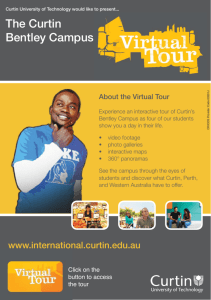
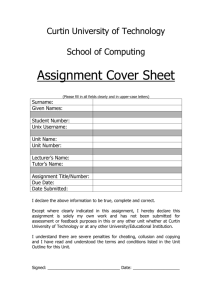
![Assignment coversheet (single) [ 48KB]](http://s3.studylib.net/store/data/008375796_1-47bef2c2c4eb4b7696d1fc3a80518558-300x300.png)
![Assignment coversheet (group) [ 126KB]](http://s3.studylib.net/store/data/008375797_1-0b6687da490940610c4ecb23456dda46-300x300.png)
